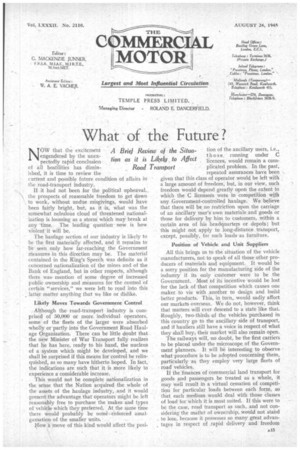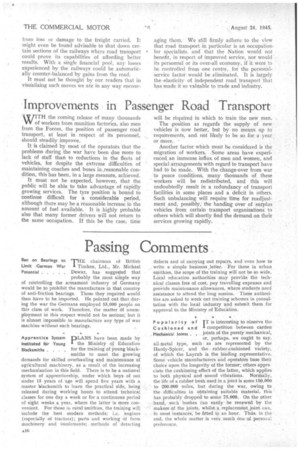What• of the Future?
Page 17

Page 18

If you've noticed an error in this article please click here to report it so we can fix it.
NOW that the excitement engendered by the unex pectedly rapid conclusion of all hostilities has diminished, it is time to review the current and possible future condition the road-transport industry.
It it had not been for the political upheaval,. the prospects of reasonable freedom to get down to work, without undue misgivings, would have been fairly bright, but, as it --is, what was the somewhat nebulous cloud of threatened. nationalization is looming as a storm which may break at any -time. _The leading questionnow is how violent it will be.
The haulage section of our industry is likely to be the first materially affected, and it remains to be seen only how far-reaching the Government measures in this direction may be. The material contained in the King's Speech was definite as it concerned nationalization of the mines and of the Bank of England, but in other respects, although there wasmention of some degree of increased public ownership and measures for the control of certain "services," we were left to read into this latter matter anything that we like or dislike.
Likely Moves Towards Government Control Although the road-transport industry is comprised of 50,000 or more. individual operators, some of the fleets of the larger were absorbed wholly or partlyinto the Government Road Haulage Organization. There can be little doubt that the new Minister of War Transport fully realizes that he has here, ready to his hand, the nucleus of a system which might be developed, and we shall be surprised if this means for control be relinquished, as so many have hitherto hoped. In fact, the indications are such that it is more likely to experience a considerable increase.
This would not be complete nationalization in the sense that the Nation acquired the whole of the assets of the haulage industry, and it would present the advantage that operators might be left reasonably free to purchase the makes and types of vehicle which they preferred. At the same time there would probably be some enforced amalgamation of the smaller units.
• How a move of this kind would affect the posi tion of the ancillary users, i.e., those, running under C licences, would remain a complicated problem. In the past, repeated assurances have been given that this class of operator would be left with a large amount of freedom, but, in our view, such freedom would depend greatly upon the extent to which the C licensees were in competition with any Government-controlled haulage. We believe that there will be no restriction upon the carriage of an ancillary user's own materials and goods or those for delivery by him to customers, within a certain area of his headquarters or depots; but this might not apply to long-distance transport, except, possibly, for such loads-as furniture.
Position of Vehicle and Unit Suppliers All this brings us to the situation of the vehicle manufacturers, not to speak of all those other producers of materials and equipment. It would be a sorry position for the manufacturing side of the industry if its only customer were to be the Government. Most of its incentive would be lost for the lack of that competition which causes one maker to vie with _another to design and build better products. This, in turn,. would sadly affect our markets overseas. We do not, however, think that matters will ever descend to a state like that. Roughly, two-thirds of the vehicles purchased in this country go to the ancillary side of transport, and if hauliers still have a voice in respect of what they shall buy, their market will also remain open.
The railways will, no doubt, be the first carriers to be placed under the microscope of the Government planners. It will be interesting to observe what procedure is to be adopted concerning them, particularly as they employ very large fleets of road vehicles.
If the finances of commercial land transport for goods and passengers be treated as a whole, it may well result in a virtual cessation of competition for particular loads between each form, so' that each medium would deal With those classes of load for which it is most suited. If this were to be the case, road transport as such, and not considering the matter of ownership, would not stand • • to lose, because it possesses so many great advan, tages in respect of .rapid delivery and freedom .&15 horn loss or damage to the freight carried. It might even be found advisable to shut down certain sections of the railways where road transport could prove its capabilities of affording better results. With a single financial pool, any losses experienced by the railways could be automatically counter-balanced by gains from the road. It must not be thought by our readers that in visu'alizing such moves we are in any way encour
aging them. We still firmly adhere to the view that road transport in particular is an occupation. for specialists, and that the Nation would not benefit, in respect of improved service, nor would its personnel or its over-all economy, if it were to be controlled from one centre, for the personalservice factor would be eliminated. It is largely the-elasticity of independent road transport' that has made it so valuable to trade and industry.




















































